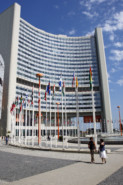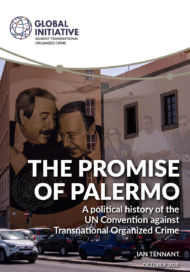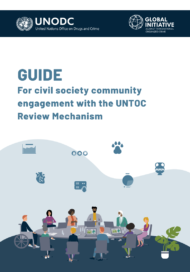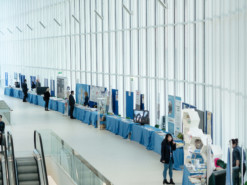Posted on 23 Oct 2020
The review mechanism to the UNTOC was launched at the 10th CoP in Vienna, but this significant milestone in the life of the convention was reached amid subdued media and wider interest, and a continuing trend of hostility towards civil-society organizations by some parties. Unexpected progress was made on other crime issues, notably on trafficking in cultural property.
From 12 to 16 October, the UN hosted the 10th Conference of Parties (CoP) to the UN Convention against Transnational Organized Crime (UNTOC). This was the first major conference organized by the UN Office on Drugs and Crime (UNODC) since the COVID-19 pandemic struck Europe. This year’s UN Crime Congress and UN Commission on Crime Prevention and Criminal Justice (CCPCJ) were postponed (to December 2020 and March 2021, respectively).
In her opening address, UNODC Executive Director Ghada Waly highlighted the CoP’s main aim of launching the UNTOC’s Implementation Review Mechanism, but also pointed to the Convention’s high adherence numbers and the significant amount of varied resolutions tabled, which she claimed demonstrated the success and importance of the CoP. Alongside the challenges posed by the pandemic, Waly emphasized fraudulent medicines and cybercrime as key issues for the international community to address.
The CoP officially launched the review mechanism, and significant progress was also made in other areas outside of its core mandates, which is unusual. Notably, it has been charged with overseeing a process to consider adding a new instrument to the existing framework for international cooperation. It also took tentative steps forward on environmental crime (in line with intermittent campaigns to add a fourth protocol to the UNTOC on this issue), and on Waly’s stated priority of fraudulent medicines.
The CoP has benefited from the postponement of the CCPCJ and the Crime Congress, where some issues would normally be addressed. However, despite the progress made and the significance of the meeting, which marked the 20th anniversary of the establishment of the Convention, media and wider public interest and awareness remained remarkably low (an exception being the Italian media).
20th anniversary and launch of the review mechanism
This year’s CoP was significant for two main reasons. The launch of the review mechanism was formalized through the adoption of a technical resolution, tabled by Italy. After years of political disagreement, the mechanism was officially established in 2018, and finally arriving at the launch is a significant milestone in the history of the Convention.
In parallel, Italy submitted a more substantive resolution celebrating the Convention’s 20th anniversary and calling for its effective implementation. This resolution urges states to recognize the UNTOC’s broad scope of application, the links between various forms of organized crime, and the pandemic’s socio-economic effects on crime. Interestingly, the resolution goes further than previous UN documents on highlighting the importance of human rights in fighting organized crime, as well as going into new levels of detail on the importance of the economic dimensions of organized crime investigations.
Developments on the UNTOC’s protocols
Mexico tabled a resolution on firearms trafficking, the focus of one of the Convention’s three supplementary protocols. And the US tabled a resolution concerned with the implementation of the Trafficking in Persons Protocol. Despite its consensual content, the US faced a lengthy negotiation on this text, due to political motives, with difficulties emanating from delegations, including Iran – which is not a party to the UNTOC – and Venezuela. The Iranian delegation caused a wide range of problems across many negotiations during the Conference, despite being one of the few countries in the world that is not a party to the Convention. The absence of a resolution on the Smuggling of Migrants Protocol is notable, given the ongoing migration crisis and the lack of international consensus on how to address it.
Other forms of organized crime
Despite the COP’s usual focus on its core mandate, in the absence of any other multilateral opportunities, cultural property returned to the agenda, thanks to Egypt, whose ambassador chairs the Conference. In addition, France tabled a resolution on environmental crime, and Belgium submitted one on trafficking in fraudulent medicines.
Trafficking in cultural property has been a long-standing divisive issue at the UNODC’s policymaking bodies. Egypt, Greece, Iraq, and others are keen to promote a new instrument on cultural property that could have implications for the return of historical artefacts from overseas museums, which is why other countries, including France, the UK, Germany and the US, have always been against it. They maintain that the UNTOC and other existing instruments are enough to cover this issue. That is why the adopted resolution did not include any concrete commitments to a new instrument. Nevertheless, Egypt scored a victory in the resolution’s agreement to set up an intergovernmental working group to explore ways of strengthening the international legal framework to combat cultural property crime.
The Belgian resolution on manufacturing and trafficking in falsified medical products draws attention to this form of transnational organized crime, which has been become more high-profile because of the pandemic. However, there is a lack of multilateral consensus on understanding and definitions, and how to respond. Consequently, the resolution does not launch any new processes but continues UNODC research and advocacy, and invites states to do more. During the negotiations, big pharmaceutical-producer countries – like India, Brazil and the US – were resistant to what they saw as unwelcome proposals from Belgium.
France’s resolution on environmental crime called on states to implement the Convention with a focus on these crimes. It also set up a discussion within the framework of the Conference’s working groups – markedly less institutional progress than the Egyptian resolution achieved. This is another issue that faces definitional challenges, with Brazil particularly defensive on what it sees as an attempt to link criminal issues with wider environmental ones. This resolution was agreed to in the context of renewed civil-society campaigning to include wildlife crime as a fourth protocol to the UNTOC.
Evaluation of the hybrid format
The state parties decided to hold the meeting in a ‘hybrid’ format – partly in person and partly online. This applied to the plenary of the Conference, and to the elements of the Conference where resolutions are negotiated and only country representatives are allowed. Side events were held in an exclusively online format.
Several drawbacks became evident with this format, especially attendees’ inability to engage in interactive discussions. The plenary was reduced in time, with no introductory presentations or panels, and strict limits of three minutes per speaker. The lack of interaction continued as the Chair hurried through the agenda items. This meant that out of the 190 countries in attendance (as well as several IGOs and NGOs), the Conference covered all substantive agenda items in only four hours so that the plenary could be suspended in favour of resolution negotiations. Several NGO speakers found themselves unable to participate, as the agenda items moved so quickly, and late requests from NGOs were not permitted. NGOs are not permitted to attend the resolution negotiations, so they were not able to attend any physical meetings from Wednesday lunchtime until Friday evening (after 21:30), when the plenary was suspended.
The side events were open to civil-society, as they were all online. These events offered more opportunity for substantive debate and covered a wide range of topics, albeit in short timeframes. Question-and-answer sessions were predictably short or non-existent, and there was no natural link between the plenary and side events through which networking would normally occur.
What next?
This year’s Conference was destined to be atypical and difficult to organize. Despite that, it did achieve some notable outcomes, such as officially launching the review mechanism, initiating a process towards a new instrument on cultural property, and highlighting the broad scope of application of the UNTOC through resolutions on three different types of organized crime outside of its usual scope, thereby covering the widest range of crime types of any CoP to date. Egypt has successfully used the CoP as a route to a potential new international framework on trafficking in cultural property. This will encourage those campaigning for a fourth protocol on wildlife crime or more progress on fraudulent medicines to take a similar route.
The trend to attempt to block civil society at the UN persisted at this year’s Conference, with Turkey objecting to the attendance of Article 19, the Japan Federation of Bar Associations, the International Institute for Peace and the International Association of Judges. The lack of support for Turkey’s position meant that these organizations could attend the proceedings, but the accusations made against the NGOs will be included in the official report of the Conference. The combination of growing hostility towards civil society and pandemic-related restrictions has the potential to create an ever-growing distance between intergovernmental processes and civil society, something that needs to be front of mind as the delayed 14th UN Crime Congress is organized.
Eye on Cairo
The Egyptian ambassador becoming chairman of this CoP is significant in the broader context. He will remain in this position for the next two years, until the beginning of the next CoP, meaning he is responsible for the subsidiary bodies and for chairing the Extended Bureau (which will, for example, make decisions on the organization of the working group on cultural property).
Waly, who has been executive director of the UNODC since the beginning of 2020, is a former Egyptian government minister and will oversee the UNODC’s preparation of the upcoming important events of the UN Crime Congress and the UN General Assembly Special Session Against Corruption. In addition, Egypt will host the next CoP to the UN Convention Against Corruption in 2021. We can expect Egypt to push forward with its priorities, but it will be important to maintain a vigilant eye on how Egypt’s domestic restrictions on human rights and civil society influence all these processes.



